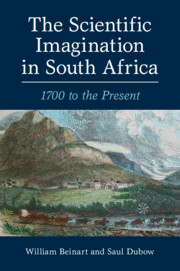Book contents
- The Scientific Imagination in South Africa
- The Scientific Imagination in South Africa
- Copyright page
- Contents
- Map
- Figures
- Acknowledgements
- Introduction: The Scientific Imagination in South Africa
- 1 Scientific Imagination and Local Knowledge at the Cape in the Eighteenth Century
- 2 Scientific Governance and Colonial Institutions, c. 1800–70
- 3 Technological Innovation and the Scientific Imagination in Mining and Agriculture, 1870–1902
- 4 Science, Reconstruction and the Imagining of the First ‘New’ South Africa, 1902–29
- 5 The Commonwealth of Knowledge, 1930–48
- 6 The Republic of Science, 1948–90
- 7 Big Science and Indigenous Knowledge: Post-Apartheid South Africa and the African Renaissance
- Afterword
- Select Bibliography
- Index
5 - The Commonwealth of Knowledge, 1930–48
Published online by Cambridge University Press: 07 May 2021
- The Scientific Imagination in South Africa
- The Scientific Imagination in South Africa
- Copyright page
- Contents
- Map
- Figures
- Acknowledgements
- Introduction: The Scientific Imagination in South Africa
- 1 Scientific Imagination and Local Knowledge at the Cape in the Eighteenth Century
- 2 Scientific Governance and Colonial Institutions, c. 1800–70
- 3 Technological Innovation and the Scientific Imagination in Mining and Agriculture, 1870–1902
- 4 Science, Reconstruction and the Imagining of the First ‘New’ South Africa, 1902–29
- 5 The Commonwealth of Knowledge, 1930–48
- 6 The Republic of Science, 1948–90
- 7 Big Science and Indigenous Knowledge: Post-Apartheid South Africa and the African Renaissance
- Afterword
- Select Bibliography
- Index
Summary
Under Prime Minister J. B. M. Hertzog (1924–1939), the state became increasingly central to scientific research and industrialisation. Hendrik van der Bijl and H. J. Van Eck developed national power supply through the state electricity commission (Escom) and used the Industrial Development Council to fund state-led enterprises. State officials and scientists devoted themselves to environmental issues from soil erosion to irrigation, invasive plants and vermin eradication. With Jan Smuts back in power in the war years, competing ‘worlds of possibilities’ emerged in political and scientific imaginations: Anglophone and liberal constituencies looked forward to reforms and postwar reconstruction; the African National Congress focussed on social progress, welfare and human rights for all; Afrikaner nationalists began to envisage an alternative utopia of republican independence and apartheid. The promise of science in helping to deliver these outcomes was expressed by all three political traditions. Improved economic prospects, fuelled by the expansion of gold mining, encouraged urbanisation, state planning, industrial development and social welfare. Science became an arm of an increasingly interventionist state, planning for national postwar reconstruction that envisaged less rigid racial divisions and promised conservation and development in African areas.
Keywords
- Type
- Chapter
- Information
- The Scientific Imagination in South Africa1700 to the Present, pp. 207 - 263Publisher: Cambridge University PressPrint publication year: 2021

